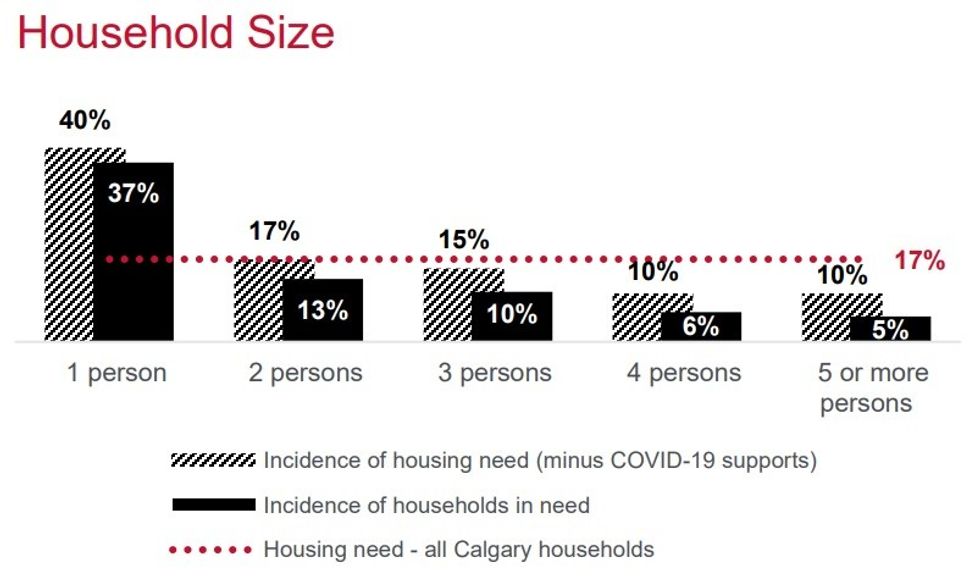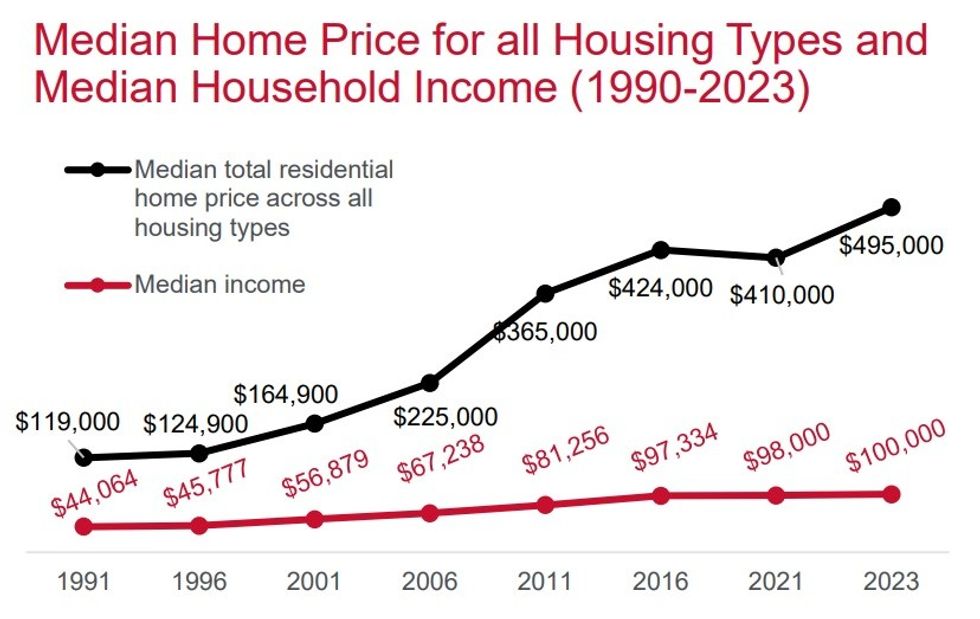Every five years, the City of Calgary publishes a Housing Needs Assessment that compiles quantitative data from the latest federal census, the Canada Housing and Mortgage Corporation, and the City itself, and translates it into a report that informs the City's housing policies.
On Wednesday, the City released its latest Housing Needs Assessment, and left no room for doubt about the deterioration of the city's housing situation.
"Calgary is experiencing a housing crisis," said Manager of Housing Solutions Tim Ward. "The latest data published in the Housing Needs Assessment shows us that an increasing number of Calgarians are struggling with housing affordability. The findings in the assessment also highlight that the housing crisis is affecting a wide range of Calgarians including those looking to buy or rent a home, and those that are in greatest need of affordable housing supports."
The full Housing Needs Assessment report can be read on the City website, but here are 10 of the more shocking factoids that provide a sense of what the housing crisis in Calgary looks like.
1. The number of households in need of affordable options is four times the current affordable housing supply.
According to the City of Calgary, although the proportion of households that are in need of affordable housing has remained about level in the past three decades, at an average of 18%, the true number of households has almost doubled, in large part due to the tremendous population growth Calgary — and Alberta as a whole — has seen.
That number was around 45,000 in 1991 and surpassed 84,000 by 2021. Meanwhile, the supply of affordable housing by 2021 was just under 21,000. The City also estimates that the number of households needing affordable housing will reach 100,000 by 2026 and then 112,000 by 2036.
2. Single-person households experience double the rate of housing need.
The average rate of housing need — which the City defines as individuals that earn less than $63,700 and spend 30% or more of before-tax income on housing — across all household sizes is 17%.
Of course, it's reasonable to expect affordable housing need to decrease as household size increases, as a result of more income, but the rate at which single-person households experience housing need is more than double that of two-person households.
Elsewhere in the report, the City also notes that singles make up 26% of all households in Calgary, but make up 57% of households that are in need of affordable housing.

3. Calgary Housing Company’s waitlist increased by 18% over five years.
The City says housing waitlists serve as a "snapshot" of the demand for affordable housing, and the current snapshot shows that the demand is growing steadily.
The Calgary Housing Company is Calgary's largest provider of affordable housing and currently manages about 33% of all non-market housing in Calgary, according to the City. Since 2018, the waitlist has grown from 4,153 people to 4,911 people — up 18.3% — and it is expected to continue growing.
4. Korean, Arab, Latin American, West Asian, and Black-led households experience highest incidence of housing need.
According to the City, 32% of all households in Calgary are led by people who belong to a racial minority.
While the aforementioned average rate of housing need in Calgary is 17%, the rate varies from ethnic group to ethnic group — although almost all were at 17% or higher.
Households led by those who identify as Korean, Arabic, or Latin-American had the highest rate of housing need, at over 22%, while households led by those who identify as Southeast Asian, South Asian, and Filipino had the lowest rate of housing need, at 17%, 13%, and 8%, respectively.

5. Average rents have increased at higher-than-normal rates and are expected to keep rising.
Via data from Calgary-based Rent Faster Calgary, the City found that average asking rents increased from $1,501 to $2,097 from 2020 to 2023 — a 40% increase.
For the average rent to be considered affordable, a household would need to have an annual before-tax income of about $84,000, the City notes, but at least 40% of Calgary households earn less than $80,000, according to 2021 census data.
6. Compared to the rest Canada, Calgary has a higher share of housing between $400,000 and $749,999.
Perhaps the lone bright spot is the fact that Calgary has significantly more housing options priced between $400,000 and $749,999 than most of Canada.
According to the report, 55% of Calgary's housing supply falls within this price range, whereas the proportion for the rest of Canada is at only 32%.
About 23% of Calgary's housing supply falls between $400,000 and $499,999, followed by options between $500,000 and $599,999 (17%), between $600,000 and $749,999 (15%), and between $350,000 and $399.999 (10%).
7. The median home price in 2023 is five times Calgary’s annual median income.
As of 2023, the median income in Calgary is at about $100,000. The median home price is at $495,000, which means it's nearly five times more than the median income.
Considering that the median home price in other provinces is likely much higher, while the median income is probably relatively similar, a fivefold gap is actually not that bad, but hurts a lot more when compared to 1991, when the median income was $44,064 and the median home price was $119,000.

8. At least 49,860 households are in core housing need.
While "affordable housing" is defined as housing that costs 30% or less of before-tax income, people with "core housing need" are those who are spending 30% or more for housing that is inadequate, such as a one-bedroom apartment for a family with multiple children.
By that measure, Calgary has nearly 50,000 households in core housing need, with about 9.8% of all households in Calgary meeting the criteria. That number is actually an improvement from the 11.8% in 2016, but Calgary is now as close to the national average (10.1%) as it has been since at least 2006.
9. Calgary experienced the highest rate of growth in consumer prices across large Canadian cities.
The more income spent on housing, the less income there is to spend on other things, and it certainly doesn't help that Calgary has experienced worse inflation than other large Canadian cities.
Between 2012 and 2022, Calgary experienced a 26.4% growth in consumer prices due to inflation, which was the highest in the nation, ahead of Toronto (26.2%), Ottawa (26.1%), Edmonton (24.3%), and Vancouver (24.2%).
10. Calgary has led population growth over the last decade.
Between 2012 and 2022, Calgary was the top Canadian city in terms of total population growth, seeing a 23.7% growth in its population, which was more than Edmonton (22.9%), Vancouver (17.5%), Ottawa (15.0%), and Toronto (14.2%).
Additionally, as of the 2021 census, Calgary's population was at 1,306,784, and is expected to surpass 1.5 million by 2028, fueled by both interprovincial and international migration, which means many of the existing issues and statistics could get dramatically worse if no action is taken.
This Housing Needs Assessment comes after the City formed a 15-member Housing and Affordability Task Force last year, which was created to "bring together people who build, study, and have experience living in different levels of the housing continuum, and use their experience and recommendations to improve our approaches to improving housing affordability and increasing access to affordable housing," according to the City.
In June, the Task Force brought forth six overarching recommendations to address Calgary's housing crisis. The task force is now expected to bring forth a formal housing strategy on Thursday, September 14, and a special council meeting is now also expected to take place on Saturday, September 16, at the request of Mayor Jyoti Gondek, who called for the meeting on Wednesday following the release of the assessment report.
- Calgary Is Becoming Less Affordable For Both Renters and Homeowners ›
- Calgary Council Approves $53.5M Towards Affordable Housing Redevelopment ›
- Feds Holding Funding Until Calgary Ends Exclusionary Zoning ›
- Condos In Calgary Continue To Soar In The Resale Market ›
- Calgary Receives $228M Via Federal Housing Accelerator Fund ›
- Calgary Is Now A Different Kind Of Outlier When It Comes To Affordability ›
- Calgary Home Sales Dip In 2023 Amid "Notable Shift" To Condos ›
- Calgary Homebuyers "Acting Quickly," But Inventory At Historic Lows ›
- How The City Of Calgary's New Housing Land Fund Will Work ›
- Calgary Making "Significant Strides" With New Housing Strategy ›
- Calgary Real Estate Board Downgrades 2025 Forecast Due To Uncertainty ›




















